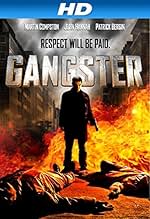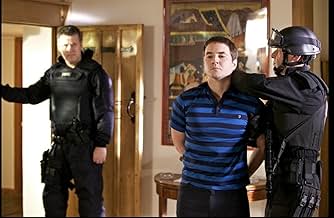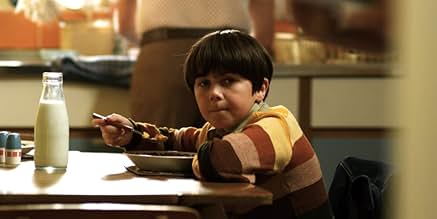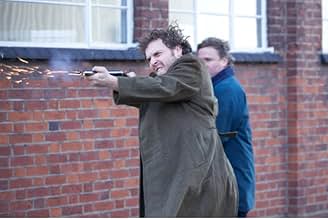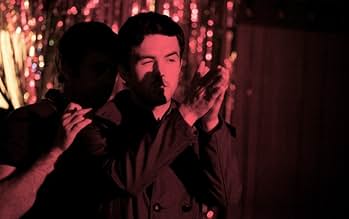AVALIAÇÃO DA IMDb
6,1/10
2,8 mil
SUA AVALIAÇÃO
Adicionar um enredo no seu idiomaThe true-life story of Paul Ferris.The true-life story of Paul Ferris.The true-life story of Paul Ferris.
- Prêmios
- 2 vitórias e 2 indicações no total
Avaliações em destaque
British cinema has not been at its best in recent years. All of our most brilliant story tellers go to Hollywood. The story here is good. Compelling even. The main characters journey from scared boy to prolific gangster is a decent enough. Rather than being a bad story done well, this is a good story done badly. The writing isn't great, although the acting is for the most part decent. The film fails because the narrative is massively disjointed, which is a shame because the production values seem quite high and if a little more care had been taking in 'how' to tell this good story then it would have been a decent film. Watch if you have nothing better to do.
"What must be appreciated is that war among civilians,such as I am describing, is ever so much more ambiguous and enigmatic than a war between nations". Joe Bonanno.
No pop-corn was crunched, by a decent-sized Glaswegian audience, as they intently watched this film.
Fact. There was another boy who grew up in Blackhill. He avoided drink and got into politics, becoming a local councillor, then council leader, then elected to the Scottish Parliament and held ministerial office. Not all people from Blackhill are the same. Not all Glaswegians are the same.
Male lead plays a boy who grew up in the Blackhill area of Glasgow. The area was a scheme (peripheral estate), which was well known for its criminality and violence. The fear of violence that pervaded this, and similar areas of Glasgow, is shown well in early parts of the film, and throughout it.
The boy is shown trapped in this violent environment, and as he grows up, he has to try to cope with this reality. This film is based on the autobiography of his life. A generation ago, there was a film entitled 'A Sense of Freedom', and this film is of the same genre. The main events in this film occurred about two decades ago in Glasgow. It is amazing that it has taken so long to make a film of those events, as there was always a decent gangster film to be made on the subject. Organized crime in Glasgow is not highly structured, it is based around blood-families and this is shown well in the film. Casual violence is also associated with territorially-based street-gangs.
Lead male acts well, as does the rest of the cast. Main gang-leaders are played well and convince in their roles of gang-leaders oozing cunning and inspiring fear. Their names were well known to Glaswegians, this reviewer has been in company where a certain name has hardly dared to be whispered.
The main events in the film will be familiar to many Glaswegians. It has been too long since this reviewer read the autobiography, or any thing else on the subject, to see how closely the film sticks to this. However, broadly, film sticks to events that are well known; legally, in at least one version of events, or just as mere street gossip.
The film tries to give explanations, which causes the film to jump about a bit chronologically. Real events are shown, but sometimes the chronology is changed. Other real events are added to, for legal or artistic reasons, and they will be easily spotted by Glaswegians. Most of the main events will be familiar to Glaswegians. Outsiders would be surprised how truthful some things were, sometimes just very little details.
The film was not made with a lot of money and this sometimes shows in some stage-sets. There was very little location shooting done in Glasgow, which no doubt Glaswegians will miss and notice. Those not familiar with Glasgow, please note, this does not ruin the film, but please be aware, the real-life Glasgow locations were less grand and more grim. One particular location could not be filmed as it had been demolished. A well-known story, which sadly is not in the film.
I remember reading 'Donny Brasco' many years ago, thinking it would be a great film, and not happy when the film came out, as it was very different from the book. However, 'Donny' is a good film. Treat this film the same way. For artistic and legal reasons, sometimes things need to be changed. The recollections of one person may not match those of someone else.
Some criticize this film for glamourizing violence. This reviewer disagrees. Criminality, gangsterism and violence are de-glamourized by this film.
This film should always have been made. The subject matter makes that so. It is a good gangster film, hence; 7/10.
No pop-corn was crunched, by a decent-sized Glaswegian audience, as they intently watched this film.
Fact. There was another boy who grew up in Blackhill. He avoided drink and got into politics, becoming a local councillor, then council leader, then elected to the Scottish Parliament and held ministerial office. Not all people from Blackhill are the same. Not all Glaswegians are the same.
Male lead plays a boy who grew up in the Blackhill area of Glasgow. The area was a scheme (peripheral estate), which was well known for its criminality and violence. The fear of violence that pervaded this, and similar areas of Glasgow, is shown well in early parts of the film, and throughout it.
The boy is shown trapped in this violent environment, and as he grows up, he has to try to cope with this reality. This film is based on the autobiography of his life. A generation ago, there was a film entitled 'A Sense of Freedom', and this film is of the same genre. The main events in this film occurred about two decades ago in Glasgow. It is amazing that it has taken so long to make a film of those events, as there was always a decent gangster film to be made on the subject. Organized crime in Glasgow is not highly structured, it is based around blood-families and this is shown well in the film. Casual violence is also associated with territorially-based street-gangs.
Lead male acts well, as does the rest of the cast. Main gang-leaders are played well and convince in their roles of gang-leaders oozing cunning and inspiring fear. Their names were well known to Glaswegians, this reviewer has been in company where a certain name has hardly dared to be whispered.
The main events in the film will be familiar to many Glaswegians. It has been too long since this reviewer read the autobiography, or any thing else on the subject, to see how closely the film sticks to this. However, broadly, film sticks to events that are well known; legally, in at least one version of events, or just as mere street gossip.
The film tries to give explanations, which causes the film to jump about a bit chronologically. Real events are shown, but sometimes the chronology is changed. Other real events are added to, for legal or artistic reasons, and they will be easily spotted by Glaswegians. Most of the main events will be familiar to Glaswegians. Outsiders would be surprised how truthful some things were, sometimes just very little details.
The film was not made with a lot of money and this sometimes shows in some stage-sets. There was very little location shooting done in Glasgow, which no doubt Glaswegians will miss and notice. Those not familiar with Glasgow, please note, this does not ruin the film, but please be aware, the real-life Glasgow locations were less grand and more grim. One particular location could not be filmed as it had been demolished. A well-known story, which sadly is not in the film.
I remember reading 'Donny Brasco' many years ago, thinking it would be a great film, and not happy when the film came out, as it was very different from the book. However, 'Donny' is a good film. Treat this film the same way. For artistic and legal reasons, sometimes things need to be changed. The recollections of one person may not match those of someone else.
Some criticize this film for glamourizing violence. This reviewer disagrees. Criminality, gangsterism and violence are de-glamourized by this film.
This film should always have been made. The subject matter makes that so. It is a good gangster film, hence; 7/10.
As a Glaswegian, I was certainly aware of the real-life main criminal characters in this film without knowing all the ins and outs of who did what to whom, when and why. I largely looked in vain however for actual Glasgow locations, although the notes here tell me that's because the local police refused cooperation, which isn't hard to understand, watching the film.
The film itself is a tough, often violent look at turf wars in Glasgow and in particular the rival bosses fighting it out for control and centres on Paul Ferris, a very well known character in these parts. It tells his story using childhood flashbacks to demonstrate the influence of his old-fashioned tough-love father, his friendship with two childhood buddies, whose fates at the end of the film help convince Ferris to go straight at last and of course his introduction to violence amongst both police and thieves which helped lead him on his criminal path.
The story itself of a gangster's rise and fall isn't original and doesn't really aim for any great dynamism or originality in the direction either. Its striving for realism is limited by the afore-mentioned substitution for Glasgow by London, the noticeable (but not unwelcome) tempering of the way brutal beatings-up and shootings are depicted, plus the character acting in the cast isn't completely consistent.
Martin Compston is slightly restricted in his portrayal of the titular character Paul Ferris by his baby-face demeanour but otherwise carries off a tricky, if clichéd part with plenty of conviction. John Hannah as a scheming would-be kingpin and Denis Lawson as Ferris's father lend experience to their parts and probably stand out accordingly from the rest of the cast.
One could argue that the film is skewered too much in favour of Ferris's viewpoint and indeed the criminal lifestyle and modus-operandi altogether with the police and prison officials invariably shown as corrupt, barbaric and above the law they supposedly serve. Nevertheless the story, though hindered by the intrusive insertions of flashbacks to young Paul, in a failed attempt to demonstrate the child being father to the man, has a kinetic energy which keeps you watching until the bitter end.
Not an easy watch or even a great watch, but otherwise a good attempt at a contemporary true-crime story.
The film itself is a tough, often violent look at turf wars in Glasgow and in particular the rival bosses fighting it out for control and centres on Paul Ferris, a very well known character in these parts. It tells his story using childhood flashbacks to demonstrate the influence of his old-fashioned tough-love father, his friendship with two childhood buddies, whose fates at the end of the film help convince Ferris to go straight at last and of course his introduction to violence amongst both police and thieves which helped lead him on his criminal path.
The story itself of a gangster's rise and fall isn't original and doesn't really aim for any great dynamism or originality in the direction either. Its striving for realism is limited by the afore-mentioned substitution for Glasgow by London, the noticeable (but not unwelcome) tempering of the way brutal beatings-up and shootings are depicted, plus the character acting in the cast isn't completely consistent.
Martin Compston is slightly restricted in his portrayal of the titular character Paul Ferris by his baby-face demeanour but otherwise carries off a tricky, if clichéd part with plenty of conviction. John Hannah as a scheming would-be kingpin and Denis Lawson as Ferris's father lend experience to their parts and probably stand out accordingly from the rest of the cast.
One could argue that the film is skewered too much in favour of Ferris's viewpoint and indeed the criminal lifestyle and modus-operandi altogether with the police and prison officials invariably shown as corrupt, barbaric and above the law they supposedly serve. Nevertheless the story, though hindered by the intrusive insertions of flashbacks to young Paul, in a failed attempt to demonstrate the child being father to the man, has a kinetic energy which keeps you watching until the bitter end.
Not an easy watch or even a great watch, but otherwise a good attempt at a contemporary true-crime story.
I was interested to see this movie as I had heard about it in production and thought a Scottish gangster film would be entertaining. Well, first you have to tune in to the Scottish accent which my wife found pretty hard. But other than that I found it a very enjoyable romp with a few scenes that make you flinch or smile but without the use of close up gore. How accurate it is historically is questionable but that is true of almost all "true life" movies, nevertheless the characters are well developed and largely believable and there are some great performances from Martin Compston as Ferris, John Hannah as Tam McGraw and particularly Stephen McCole as a troubled Junior Thomson. Watch it with an open mind and enjoy, The Godfather it isn't but for a low budget UK produced movie it is good entertainment.
I wasn't sure what to expect, a fairly absorbing movie dramatising the life of infamous Glaswegian Paul Ferris. A gangster with a degree of notorioty, the film puts him in a fairly good light, I'm not too sure that was the case in real life events. Well acted for the most part, Martin Compston is always a great performer, he brings the film to life. I have to say I loved Rita Tushingham's turn as Rita, not in it for long, but she was great. The violence was well realised, hard hitting and visually strong, great effects, explosions etc. The period detail was excellent, great cars, clothes etc. It's not a film I'd make a regular watch, but a decent watch nonetheless. 6/10
Você sabia?
- CuriosidadesDue to Strathclyde Police (now Police Scotland) refusing to co-operate with the production company the movie was shot in London, not Glasgow.
- ConexõesFeatured in Film '72: Episode dated 16 January 2013 (2013)
- Trilhas sonorasDead Mans Shoes
written and performed by Scott Peden. Courtesy of SM Records,
Copyright Scott Peden/SM Records 2012. From the Album, The Complete and Utter Confidence of Ignorance.
Principais escolhas
Faça login para avaliar e ver a lista de recomendações personalizadas
- How long is The Wee Man?Fornecido pela Alexa
Detalhes
- Data de lançamento
- País de origem
- Idioma
- Também conhecido como
- Gangster
- Locações de filme
- Millennium Mills, West Silvertown, Londres, Inglaterra, Reino Unido(Ferris meets with Arthur Thompson)
- Empresa de produção
- Consulte mais créditos da empresa na IMDbPro
Bilheteria
- Faturamento bruto mundial
- US$ 609.607
- Tempo de duração1 hora 46 minutos
- Cor
- Proporção
- 1.78 : 1
Contribua para esta página
Sugerir uma alteração ou adicionar conteúdo ausente

Principal brecha
By what name was The Wee Man (2013) officially released in Canada in English?
Responda


